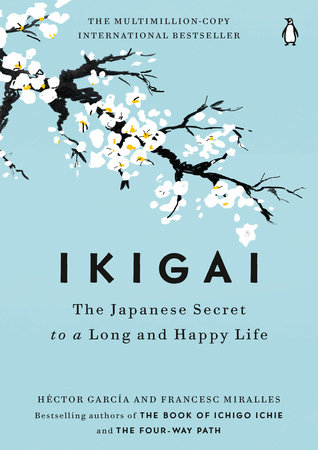7 Ways to Find Joy in Your Always Busy Life with Ikigai
by Héctor García & Francesc Miralles
The pace of life today makes it seem that nothing, short of making a radical shift and going off to live in the wilderness, will allow us to find a calmer way of life. The good news is that it is indeed possible to lead a very busy life and feel happy and fulfilled at the same time. According to Japanese tradition, every person has an ikigai, a reason for living. When you find your ikigai — the place where passion, profession, and purpose intersect — you find meaning in the everyday. You find the happiness of always being busy.
We have found some key concepts to help busy people everywhere — including the busiest of parents — develop their sense of ikigai and find joy in their everyday lives:
1. Make it so that you like what you do. Many people dream of finding a job that they love, when the secret to happiness lies in turning this idea on its head: Find something enjoyable in everything that you do. It is a question of perspective.
2. Meditate in movement. If your schedule demands that you are constantly on the move, take advantage of your journeys and use them to do meditative exercises. Try becoming aware of your body as it moves while you walk (without looking at your phone), contemplating your surroundings with Mindfulness as you move, and paying attention to the shifting details of everything around you wherever you are.
3. Make room for your ikigai. No one is so busy that they are unable to give themselves a half-hour to read a book, take a walk in the park to refresh their thoughts, or do some activity that recharges the batteries of their souls. Be aware of phrases like “I don’t even have time to think,” which can work to sabotage ourselves so that we do not make the changes that we need to make.
4. Differentiate urgent things from important things. Urgent things are important for other people, but they are not always important to us and can lead us to lose sight of our priorities and pay attention only to the priorities of others. It’s a good thing to take care of some urgent matters during the course of the day — as long as you reserve space to do what is important for you.
5. Don’t take on obligations during your free time. In addition to working more hours than they want to, many people today take on commitments during their free time that wind up making their lives seem as chaotic as a Marx Brothers movie. Take care of those commitments that are truly necessary and which make you feel happy — and get rid of the rest. As Steve Jobs said, “Your time is limited so don’t waste it living someone else’s life.”
6. Follow some type of digital diet. Being connected all day disassociates you from yourself and interrupts those mini-breaks that could be a balm for your soul. Furthermore, hyper-connectedness exposes us to a constant avalanche of information, much of it negative. Going offline for a few hours a day is very beneficial for a healthy mental ecology, particularly before going to sleep.
7. Follow your passions. At the end of their lives no one feels proud to have worked endless hours. Instead we remember with a smile all the crazy things, both big and small, that we gave ourselves permission to do. Put adventure in your life, whether that’s by traveling, discovering, or learning new things. If you develop your hidden talents and share them with other people, you will be living with ikigai.
Translated by Steven Tolliver.
-
Learn More About the Book:
Ikigai: The Japanese Secret to a Long and Happy LifeAvailable from:Also available from:
Héctor García and Francesc Miralles are the authors of Ikigai: The Japanese Secret to a Long and Happy Life. Héctor García is a citizen of Japan, where he has lived for over a decade, and of Spain, where he was born. A former software engineer, he worked at CERN in Switzerland before moving to Japan, where he developed voice recognition software and the technology needed for Silicon Valley startups to enter the Japanese market. He is the creator of the popular blog kirainet.com and the author of A Geek in Japan, a #1 bestseller in Japan.
Francesc Miralles is an award-winning author who has written a number of bestselling self-help and inspirational books. Born in Barcelona, he studied journalism, English literature, and German, and has worked as an editor, a translator, a ghost-writer, and a musician. His novel Love in Lowercase has been translated into 20 languages.

